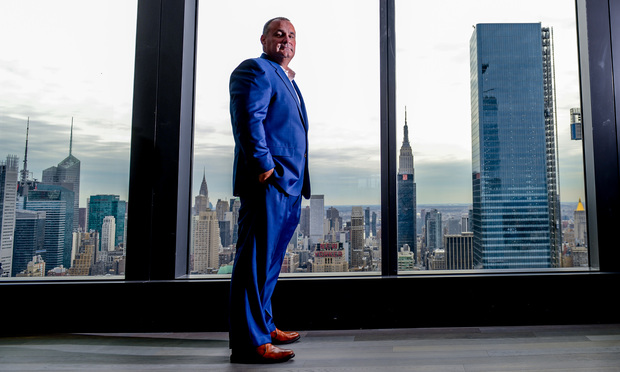Cooley Resists Cuts as CEO Peers Into a Post-Pandemic Future
"We think there will be some law firms that emerge from this circumstance better than others, and we think we're going to be one of them," said CEO Joe Conroy.
May 12, 2020 at 05:00 AM
7 minute read
The original version of this story was published on The American Lawyer
 Cooley CEO Joe Conroy in the firm's Hudson Yards offices in April 2019. (Photo: David Handschuh/ALM)
Cooley CEO Joe Conroy in the firm's Hudson Yards offices in April 2019. (Photo: David Handschuh/ALM)
Cooley rolled into 2020 in an enviable position. Revenue had increased in 2019 by nearly double digits, capping a decade of yearly growth and setting the firm up for another strong year.
Now, five months into the year, the firm has been forced to reevaluate its expectations in a world scarred by the arrival of the coronavirus. But even as he predicts demand will tumble, CEO and chairman Joe Conroy has no plans to reduce compensation or cut personnel. Instead, belt-tightening is taking place almost effortlessly, as a large budget for travel and meetings sits untouched.
The New York-based leader believes the firm's focus on representing tech and life-sciences businesses—companies that are going to create the "new normal," regardless of what it looks like—places it on solid footing to weather the storm and prosper in its aftermath. Conroy spoke to ALM about what lessons the firm has taken since the pandemic began to upend the business of law in the U.S. and abroad.
It's been two months into the crisis. I guess you have a full sense of how the transition to remote working has gone at this point.
I'm a confirmed, dedicated, firm optimist, but [it] has surpassed via a wide margin what I expected. I expected it to work and to be functional, with challenges. But for us to have moved 3,000 people out of their offices into their homes, you know, in the span of eight days. It's really been remarkable.
I spoke to [global litigation chair] Mike Attanasio a couple of weeks ago about the challenges of communicating internally under these changed circumstances. What has your message been about how to maintain a sense of connection?
Probably from day one of this, we immediately went into having management committee meetings once a week, rather than once every six weeks. I led the charge to make sure that we were developing a plan of overcommunicating, if you will, to make sure that we could bridge the distance. The messaging has been tiered, of course, because in the beginning you just want people to feel safe, and you're addressing their concerns about physical safety of their friends and co-workers, and it migrates to their desire to feel safe in their employment and that the firm is in good hands around decisions being made.
We are now starting to turn the communication with our eyes to the future, and trying to work on this narrative about how, although this is a terrible set of circumstances for all of us and we've got to buckle down and do some things differently during this period, we think there will be some law firms that emerge from this circumstance better than others, and we think we're going to be one of them.
Like a number of firms, you've built out a team specifically focused on COVID-19: both disruptions and opportunities. Can you talk about what the goal was and what the experience has been so far?
The goal was to make sure that we delivered on, with respect to our clients, this promise that we've made: that we're in real partnership with our clients, and this set of circumstances creates unbelievable exigencies for us but exigencies for our clients as well. We wanted to marshal, across our practice areas, a broad set of service offerings for our clients—resources, if you will—so that we could effectively and efficiently answer best practices to questions around areas in the law and practice that would be developing pretty quickly.
Any examples of pandemic-related representations that really stand out to you?
The one that tickles me is Spiro Devices. These folks came into our [virtual] conference room at a time when "ventilator" was every fourth word in the newspaper and came up with this notion that they could actually bring value to that and create these lower-cost ventilators. Our team met with them, in an intake/lets-get-this-project-rolling way, and we were foundational in white-boarding the product.
Along those lines, what impact do you expect this all to have on business development when you can't do the normal things you do to both build up rapport and maintain contact with clients?
That's a question I've spent hours with partners talking about and thinking about. Pitching new business—it's a two-edged sword for a firm like ours that maintains national practices. We were pitching something recently in Los Angeles, where we have a reasonably small presence compared to the other firms we were pitching against. All of our pitches were, of course, by Zoom, and so whereas four months ago, the local firms could have said, "Look, we've got more resources on the ground, I wasn't as much concerned about it." Now, over time, I think that will change. If you look at the statistics around pitches conducted and files open, we actually haven't dropped off and we've actually probably conducted more pitches, and we have about the same rate of files opening.
The question remains, in a year from now, when you can get on an airplane, how much of that stuff will still be done remotely? One of the things we've always said about our partnership that gives us a higher likelihood of performing well in a down market is we don't have service partners, we don't have nonequity partners, and we've got business development in the genes of our partners across practices.
What about remote work? Do you have any expectations that the post-pandemic normal is going to look very differently in terms of how the firm is organized and where people are working from?
Partners at large and the management committee, they're on a spectrum of what they expect the new normal to be. The far right of the spectrum being, "This will pass and we'll get a vaccine and the American public has a short memory," and the far left being, "Gosh, we're working fine remotely, why do we need space at all?" I think it would be unwise to put too much money, time and effort behind where that new normal is going to line up, because I think it's premature. That having been said, I personally feel pretty certain that, over the long haul, law firms will use materially less space than they use now.
You talked about more pitches going out and an equivalent amount of file openings, but what has demand been like since the start of March, and collections as well? Any particular trends that you can highlight?
Our board and I certainly think that we are going to face to reduced demand in 2020. I also think that we're going to be in an environment where we are going to get lower realization. That's what happens when economies worsen. That having been said, we haven't seen it as of yet. We've been, with respect to all the metrics that we measure our business, on or over plan. And that has even held up through 11 days this month on cash collections. Trying to figure out what the baseline to plan for is a little TBD. I hope I'm wrong. I don't think I am. But my guess is that when the book is written on 2020, I will look back and say, "OK, we experienced 10% less demand than we thought we would, 15%, whatever it's going to be."
This conversation has been edited for length and clarity.
Read More
Cooley Caps 10-Year Growth Streak With Big Revenue Boost, Big Hires
As Workforce Scatters, Onus Falls on Practice Group Leaders to Keep Firm Culture Intact
If Your Firm Has a Life Sciences Practice, It's Probably Very Busy Right Now
This content has been archived. It is available through our partners, LexisNexis® and Bloomberg Law.
To view this content, please continue to their sites.
Not a Lexis Subscriber?
Subscribe Now
Not a Bloomberg Law Subscriber?
Subscribe Now
NOT FOR REPRINT
© 2025 ALM Global, LLC, All Rights Reserved. Request academic re-use from www.copyright.com. All other uses, submit a request to [email protected]. For more information visit Asset & Logo Licensing.
You Might Like
View All
Justified Termination Does Not Bar Associate Attorney From Unemployment Benefits, State Appellate Court Rules
5 minute read
Trump Taps McKinsey CLO Pierre Gentin for Commerce Department GC

'None of Us Like It': How Expedited Summer Associate Recruiting Affects Law Students and the Firms Hiring Them

Upstart Insurer That's Wowing Industry Hires AIG Legal Exec to Help Guide Global Expansion
2 minute readLaw Firms Mentioned
Trending Stories
Who Got The Work
J. Brugh Lower of Gibbons has entered an appearance for industrial equipment supplier Devco Corporation in a pending trademark infringement lawsuit. The suit, accusing the defendant of selling knock-off Graco products, was filed Dec. 18 in New Jersey District Court by Rivkin Radler on behalf of Graco Inc. and Graco Minnesota. The case, assigned to U.S. District Judge Zahid N. Quraishi, is 3:24-cv-11294, Graco Inc. et al v. Devco Corporation.
Who Got The Work
Rebecca Maller-Stein and Kent A. Yalowitz of Arnold & Porter Kaye Scholer have entered their appearances for Hanaco Venture Capital and its executives, Lior Prosor and David Frankel, in a pending securities lawsuit. The action, filed on Dec. 24 in New York Southern District Court by Zell, Aron & Co. on behalf of Goldeneye Advisors, accuses the defendants of negligently and fraudulently managing the plaintiff's $1 million investment. The case, assigned to U.S. District Judge Vernon S. Broderick, is 1:24-cv-09918, Goldeneye Advisors, LLC v. Hanaco Venture Capital, Ltd. et al.
Who Got The Work
Attorneys from A&O Shearman has stepped in as defense counsel for Toronto-Dominion Bank and other defendants in a pending securities class action. The suit, filed Dec. 11 in New York Southern District Court by Bleichmar Fonti & Auld, accuses the defendants of concealing the bank's 'pervasive' deficiencies in regards to its compliance with the Bank Secrecy Act and the quality of its anti-money laundering controls. The case, assigned to U.S. District Judge Arun Subramanian, is 1:24-cv-09445, Gonzalez v. The Toronto-Dominion Bank et al.
Who Got The Work
Crown Castle International, a Pennsylvania company providing shared communications infrastructure, has turned to Luke D. Wolf of Gordon Rees Scully Mansukhani to fend off a pending breach-of-contract lawsuit. The court action, filed Nov. 25 in Michigan Eastern District Court by Hooper Hathaway PC on behalf of The Town Residences LLC, accuses Crown Castle of failing to transfer approximately $30,000 in utility payments from T-Mobile in breach of a roof-top lease and assignment agreement. The case, assigned to U.S. District Judge Susan K. Declercq, is 2:24-cv-13131, The Town Residences LLC v. T-Mobile US, Inc. et al.
Who Got The Work
Wilfred P. Coronato and Daniel M. Schwartz of McCarter & English have stepped in as defense counsel to Electrolux Home Products Inc. in a pending product liability lawsuit. The court action, filed Nov. 26 in New York Eastern District Court by Poulos Lopiccolo PC and Nagel Rice LLP on behalf of David Stern, alleges that the defendant's refrigerators’ drawers and shelving repeatedly break and fall apart within months after purchase. The case, assigned to U.S. District Judge Joan M. Azrack, is 2:24-cv-08204, Stern v. Electrolux Home Products, Inc.
Featured Firms
Law Offices of Gary Martin Hays & Associates, P.C.
(470) 294-1674
Law Offices of Mark E. Salomone
(857) 444-6468
Smith & Hassler
(713) 739-1250








